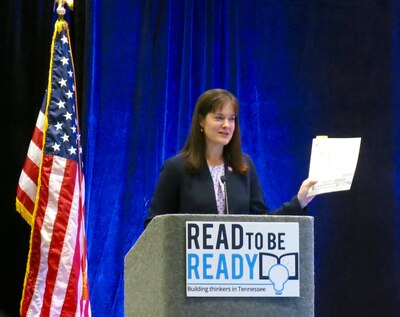A year ago, Tennessee began a quest to address its lagging literacy rate.
It started with its youngest readers through an initiative called Read to be Ready. The goal was to change the state’s approach to reading instruction beyond alphabet recognition to “authentic” experiences in which students read to learn — and for fun.
On Thursday, Education Commissioner Candice McQueen took stock of the progress after one year, laying out next steps that will focus on classroom instruction and teacher support.
The initiative, she said, must outlive its funding, which includes $4.2 million that pays mostly for a literacy coaching network and an additional $30 million for reading camps to serve 30,000 students during the next three summers.
Year Two will be about “building the framework” that can be used for years to come to teach Tennessee’s youngest students to read.

“We know the gains that we want to make will not happen overnight,” she said during a celebration event in Nashville attended by about 120 stakeholders. “The reason I’m truly optimistic is the success we have started seeing in such a short period of time.”
Researchers found that schools participating in the state’s new literacy coaching network invested significantly more time in reading comprehension last year in grades K-2 — 67 percent, compared to 37 percent in 2015.
But Tennessee has a heavy lift ahead. Only a third of its fourth-graders are proficient in reading, according to the most recent National Assessment of Education Progress. The state wants to get 75 percent of its third-graders reading on grade level by 2025.
The new network of literacy coaches sprawls across two-thirds of the state’s districts and includes 200 teacher-coaches. Working with other teachers, they select texts designed to engage and challenge students to practice more on reading and writing, and less on filling out worksheets.
“That’s why we’re investing so much in you as teachers and educators, saying your knowledge matters,” McQueen said.
Michael Ramsey, an instructional coach in Grainger County, is already seeing changes at his elementary school.
“With the coaching network, teachers have the opportunity to reflect and take (instruction) to the next step,” he said.
But, “it takes time,” Ramsey said of training the teachers and working with students. He urged state and local leaders to “just stay consistent and give us time.”

